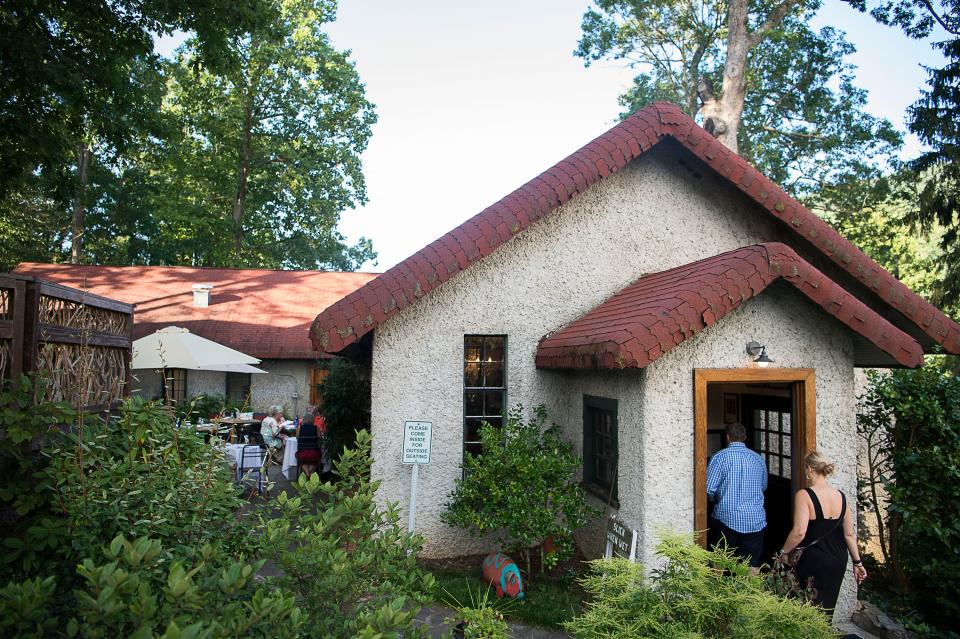On appeal: Why Asheville eatery, others cannot claim pandemic closure insurance money
ASHEVILLE - A Greek restaurant shuttered in the wake of the COVID-19 pandemic won't get insurance money for losses it said were caused by government mandates after a North Carolina Appeals Court ruled in favor of the restaurant's insurer.
A three-judge panel July 5 ruled the Golden Fleece and 15 other North Carolina restaurants owned by two chefs will not be reimbursed for losses incurred related to mandated pandemic closures in 2020.
The ruling came after the restaurants already had won a trial in Durham County Superior Court, in which a judge ruled they had the right to collect.

"We think this decision was wrongfully decided," said the restaurants' attorney, Stuart Payne. "We're just exploring our options for further review."
The beginning and end of Golden Fleece:
Golden Fleece, part of the Giorgios Hospitality Group, opened in 2016 at 11 Grovewood Road and was "such a magical place, led by the extremely talented Chef George Delidimos," according to group owner Giorgios Bakatsias, who mourned the restaurant's closure in an August 2020 news release.
Together with chef Matt Kelly, Bakatsias owned and operated all 16 restaurants, according to the case's original complaint, which included 17 restaurants — one dropped out in the course of the proceedings.
Related: Pandemic bust or boom? Asheville's new food, beverage businesses forge ahead in 2022
Months before the Golden Fleece and the other restaurants were closed, Paynter Law filed a suit May 18 in North Carolina Superior Court against the restaurants' insurer, The Cincinnati Insurance Company.
The suit was filed on behalf of GHC and the other restaurants in an attempt to force the insurance company to honor "business interruption" insurance the group had purchased years before.
Food news:Asheville eatery closes, national food tour coming, local authors\
Attorneys for the insurance company did not immediately respond to a message left by the Citizen Times.
As cited in the opinion, part of the policy states it will pay for business interruption income losses in certain circumstances.
"We will pay for the actual loss of 'business income' ... you sustain due to the necessary 'suspension' of your 'operations' during the 'period of restoration.' The 'suspension' must be caused by direct 'loss' to property at a “'premises' caused by or resulting from any covered cause of loss," the policy states.
When North Carolina Gov. Roy Cooper's executive orders at the pandemic's onset restricted restaurants to carryout/takeout and delivery operations only, the 16 plaintiff restaurants all closed by May 2020.
When owners sought coverage for losses, however, the insurance company would not pay, according to the original case in Durham County Superior Court.
Other N.C. court rulings affecting Buncombe County:
Can cops charge for trespassing on Asheville public sidewalks? NC Appeals Court revisits
NC Supreme Court issues Vance Monument stay order; city responds to request for appeal
Cawthorn loses ruling over possible insurrection disqualification for future office
The opinion noted that "loss" in the insurance policy language relates to "accidental physical loss or accidental physical damage."
The Cincinnati Insurance Company argued in Appeals Court that "the trial court erred in concluding that the Governmental Orders temporarily restricting the scope of their restaurant operations constituted direct physical loss or damage to the property. We agree," the opinion stated.
It further noted there was legal precedent about "business interruption" clauses in insurance policies. The restaurants argued they should be able to get insurance money because of "business interruption" but the court said no property had been physically lost or damaged, so that rule didn't apply.
"Further, recent cases from the Fourth Circuit have agreed that similar or identical policy provisions do not provide coverage for business interruption losses due to COVID-19 governmental orders because there is no direct physical loss or damage to the insured property," the opinion stated.
The plaintiffs wanted to effectively equate physical loss with "lose of use" when pandemic orders shuttered businesses. That was incorrect, the opinion ruled.
"According to the plain language of the Policies, only direct, accidental, physical loss or damage to the property is covered," it stated.
The Durham County Superior Court's ruling was declared reversed and the Appeals Court judges ordered judgment in favor of The Cincinnati Insurance Company.
Andrew Jones is a Buncombe County government and health care reporter for the Asheville Citizen Times, part of the USA TODAY Network. Reach him at @arjonesreports on Facebook and Twitter, 828-226-6203, or arjones@citizentimes.com. Please help support this type of journalism with a subscription to the Citizen Times.
This article originally appeared on Asheville Citizen Times: Why Asheville eatery, others can't get pandemic insurance money

